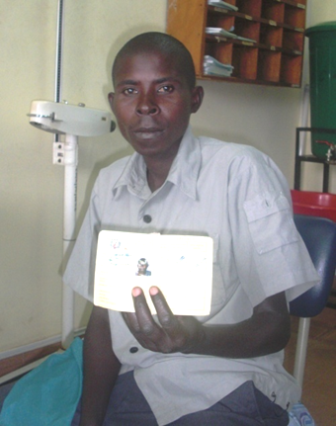
Diogène*, 37, lives in Rwanda’s Eastern province. In March 2012, he began to feel ill. He was short of breath, couldn’t walk up hills, and had chest pains. Luckily for Diogène, he holds community-based health insurance (CBHI), which enabled him to see a doctor at the Ngarama district hospital, where he was diagnosed with heart disease.
Historically called “diseases of the rich,” non-communicable diseases such as heart disease are emerging as important health problems in low-income countries like Rwanda. According to the World Health Organization, cancer, diabetes, and cardiovascular and respiratory diseases account for nearly 25 percent of Rwanda's burden of disease. This represents a major financial burden for the poorest, who generally cannot afford health care for chronic illness and, consequently, do not receive appropriate treatment.
The Rwandan Government aims to increase access to health care, including chronic care, for all people. The new CBHI policy, established in 2010, was developed through technical support and training as a part of USAID's Integrated Health System Strengthening Project. The policy introduced a system that now provides coverage to over 90 percent of Rwanda’s population. The majority of the insurance system, 55 percent, is paid for through premium payments from the population, with 21 percent of the system covered by the government, 11 percent from donors, and other system fees making up the rest.
The poorest citizens, about 25 percent of Rwanda’s population, have now been identified and receive free medical care through CBHI. Referral hospitals also accept the insurance, allowing the poorest citizens with chronic diseases to afford specialized treatment.
Prior to the introduction of CBHI, people like Diogène who were diagnosed with chronic diseases had to pay out-of-pocket for care or were unable to receive essential treatment and services. Now, patients with illnesses such as cancer, diabetes or heart disease can more easily access all levels of the health system.
"The insurance system has been very useful to me. When I heard it was available, I didn't hesitate to sign up. I do what I can now to pay my insurance fees every month, because I know how important it is," explained Diogène.
Like many others, after his diagnosis, Diogène was referred to the hospital where he received specialized advice, tests and appropriate drugs not currently available at the district level in his community. Without his community-based health insurance, he couldn’t afford even basic health care. Now, with the insurance, he receives the quality health services his life depends on.
*Full name not available.







Comment
Make a general inquiry or suggest an improvement.